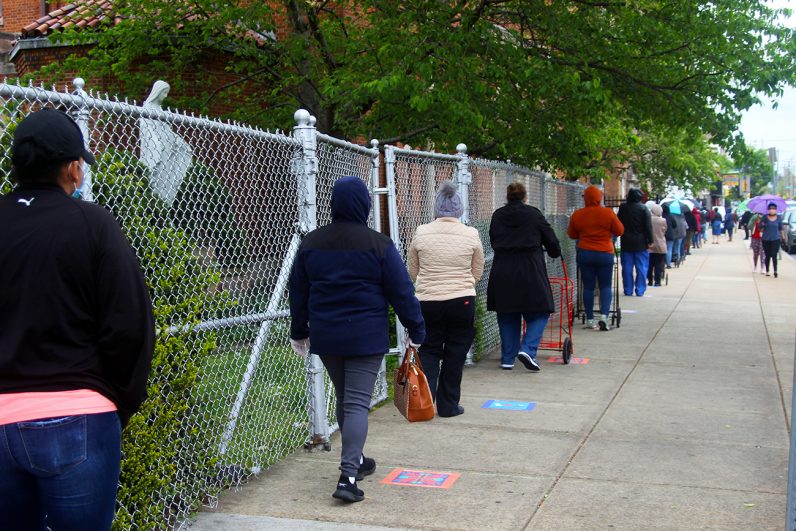
The line for an April 20 emergency food distribution at St. Joan of Arc Mission Church in Philadelphia stretched around the block. With a summer slowdown in donations, archdiocesan Nutritional Development Services is working to collect 5,000 pounds of non-perishable items by June 30 to help families made food-insecure by the coronavirus pandemic. (Photo by Gina Christian)
An archdiocesan hunger relief drive is looking for some urgent last-minute help to feed area families.
Last month, Nutritional Development Services (NDS) launched its annual “Manna Sunday” campaign, which will wrap up June 30. The collection of non-perishable items, which normally takes place at parishes and schools, was moved online due to COVID-19 restrictions.
Donors have been purchasing staples for NDS’ network of 30 food cupboards through the YouGiveGoods fundraising platform for shipment to NDS, a beneficiary of the Catholic Charities Appeal.
However, the outreach is still about 2,000 pounds short of its 5,000-pound goal.
[hotblock]
Filling that gap is more critical than ever, said Denise Hopkins, director of NDS’ community food program.
“So many more people are out of work, and we have seen a steady increase of people in need of food for their families,” Hopkins said.
NDS is “constantly fielding calls for help” from clients and organizations it has “never assisted before,” she added.
Summer is usually a “desert” period for NDS, with supplies at its pantries tending to thin as schools are closed and donors are on vacation.
Now in its third decade, Manna Sunday — named for the edible substance God provided the Israelites during their 40-year journey in the desert – was designed to offset the seasonal dip in donations.
But the pandemic is making that task much harder. Last year, 90 archdiocesan parishes signed up to participate in Manna Sunday; this year, the number is down to 29, according to NDS executive director Lizanne Hagedorn.
In addition, NDS staffers have noted that former donors to food cupboards have now become clients. Pennsylvania’s unemployment rate, like that of the nation as whole, now stands at just over 13%.
Prior to COVID-19, the city already struggled with a food insecurity rate of over 16%, with suburban rates ranging from 6.3% to 9.4%, according to data from Feeding America.
Hopkins and her team are hoping to make a dent in those numbers, even as demand for assistance soars.
“Our food cupboards are going through food faster,” she said. “And for that matter, clients rely on us for more food than they usually request.”
***
For a list of food cupboards and emergency feeding sites operated by Nutritional Development Services (NDS), visit the agency’s COVID-19 resource page.
PREVIOUS: Connelly Foundation steps in to COVID response with grants
NEXT: Destroying Serra statues sign of ‘woundedness,’ confusion, says Phila. priest



Share this story